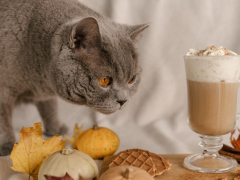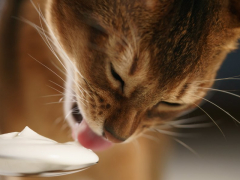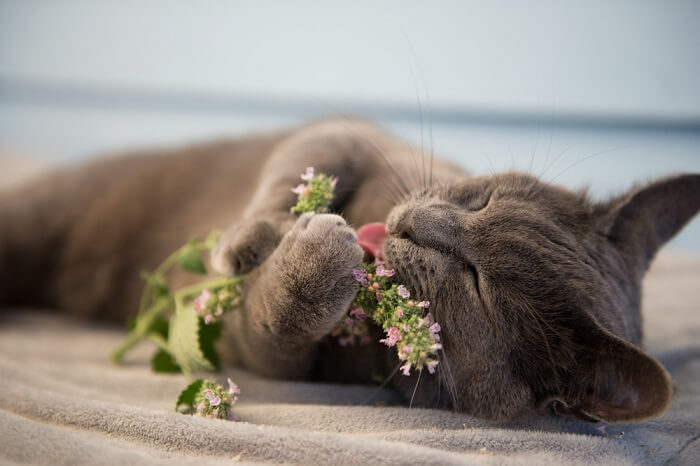
Catnip is a popular herb given to cats to smell and play with – but what happens if they eat it? In this article we’ll look at whether catnip is safe for cats to eat as well as sniff!
What Is Catnip?
Catnip is the common name for the perennial herb Nepeta cataria. It’s a member of the mint family, so you may also hear it called catmint, catswort, and catwort. However, there are some other herbs in the US sometimes called catmint, and although these are related to catnip, it’s important not to get the two confused.
Nepeta cataria is native to the Middle East, Central Asia, and parts of China but is now widespread, and is considered invasive in many parts of North America and the United States. It looks a little like a nettle, with toothed leaves, and is covered in small white flowers throughout summer and autumn.
Catnip plants can be grown from seed, or by rooting cuttings during the growing season, so you can provide fresh catnip either in the garden or grown in a pot indoors. You can also get dried catnip on its own or in catnip toys, catnip essential oil, and catnip spray from all good pet stores.
Can Cats Eat Catnip?
The great news is that cats can eat catnip! According to the Pet Poison Helpline, catnip is not toxic for cats and is safe to consume. Whilst most of the behavioral changes come when a cat smells catnip, it’s perfectly safe for a cat to eat catnip.
Of course, eating large amounts of plant matter can be bad for cats. Whilst it’s unlikely your cat will eat enough catnip to cause a problem, the large amount of fiber is not easily digested by the gut and you may find that your cat gets vomiting and diarrhea if they eat too much catnip.
The ASPCA therefore lists catnip as toxic to cats. However, this isn’t serious and is usually self-limiting.
What Does Catnip Do to Cats?
Catnip is named for its attractiveness to cats, but what does it actually do?
Catnip’s attraction to cats comes not from any nutritional benefit, but from its psychological effects. In fact, catnip is often described as ‘marijuana for cats’.
Catnip affects cats in different ways. Some will become quiet, and stare into space – almost as though catnip is a mild sedative. Others will experience the opposite effect, becoming excitable and frisky. Some cats even become aggressive.
Most simply appear to love the scent- they may purr and rub themselves over the catnip, drool, or become almost giddy with pleasure. At this point, they may lick or bite the catnip.
Also Read: Catnip: What Is It And Why Do Cats Love It?
The effects come from smelling catnip – your cat will not get the same high if they eat catnip.
Nepetalactone – The Reason Catnip Is So Wonderful
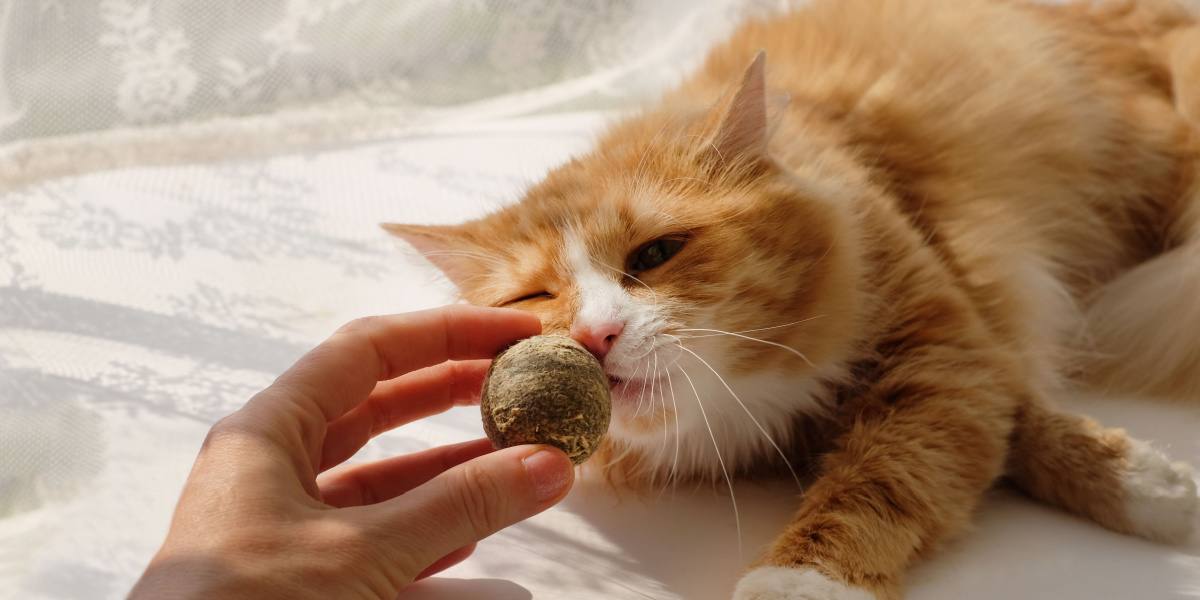
The volatile compound nepetalactone has been identified as the chemical in catnip that makes cats crazy. The plant uses this chemical ‘allomone’ to attempt to communicate with insects – either by repelling insects or by attracting beneficial ones. Nepetalic acid is also present, but its effects are unknown.
Why Does Catnip Affect Cats?
Vets and scientists aren’t completely sure why nepetalactone causes these reactions in cats. One possibility is that the scent is similar to one that cats already produce, possibly associated with being in season (estrus).
This is because the effect of the catnip, and the behaviors it produces, are similar to cats that are on heat. Cats may not respond to catnip until they are 6 months old, which also suggests a link with sexual maturity.
What we do know is that, when the nepetalactone is inhaled, it binds to receptors in the nose, sending messages to the part of the brain in charge of behavior. It used to be thought that nepetalactone mimicked a feline pheromone, but it appears that it is ‘smelled’ with the nose rather than with the vomeronasal organ, which is where pheromones are detected.
However, catnip only affects about 60 percent of cats, with the remaining third showing no response at all. It’s also hereditary, and is thought to be autosomal dominant. In other words, if either one of the parents is responsive to catnip, it’s likely the kitten will be too.
Catnip also affects other cats, including lions and jaguars, although tigers and bobcats didn’t respond much if at all.
How To Give Catnip to Cats?
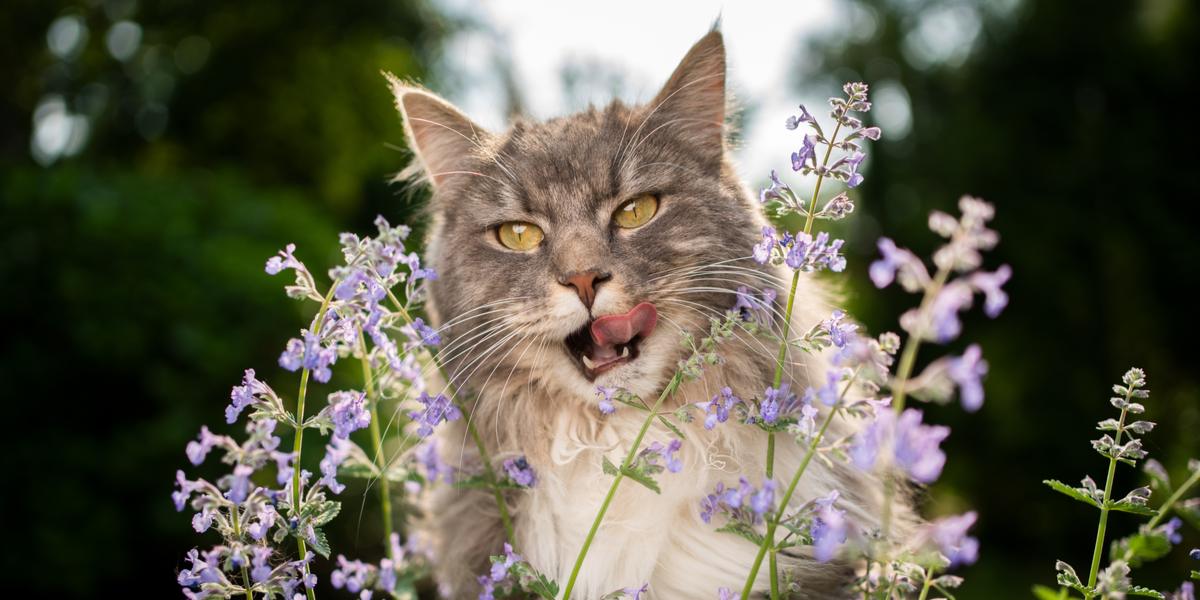
It doesn’t appear that catnip is addictive, or that the behavioral response to catnip causes any long-term problems for cats. In fact, some behaviorists argue that catnip provides ‘olfactory stimulation’ for cats, which may be a form of environmental enrichment.
You can give your feline friend fresh or dried catnip, which is often found in cat toys. To keep the volatile oils from evaporating, you should keep dried catnip and catnip toys in an airtight container. Some people also recommend spraying catnip spray or catnip oil onto your cat’s scratching post to encourage them to use it.
If your cat is responsive to the effects of catnip it seems to be fine to use catnip several times a week. However, do keep an eye on how much catnip your cat is eating, as eating too much can cause an upset stomach and digestive problems.
Are There Any Nutritional Benefits of Catnip?
Catnip is not known to have any nutritional benefits for cats. The plant is mostly fiber, and cannot easily be digested by the feline digestive system. Catnip doesn’t provide any valuable nutrients to cats that eat it.
Conclusion
Catnip causes a behavioral response in cats that includes rolling, licking, and biting. Cats sometimes eat a little catnip whilst this is happening, but don’t worry – it is safe for cats to eat a little catnip.
If cats eat a lot of catnip, they may experience vomiting and diarrhea. This is mild, but you may want to contact your vet for symptomatic treatment if it continues.


